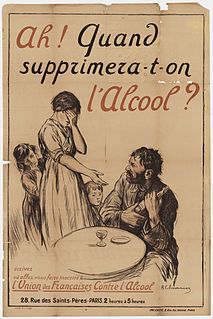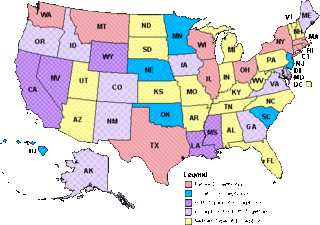Related Research Articles

Alcoholism is, broadly, any drinking of alcohol that results in significant mental or physical health problems. Because there is disagreement on the definition of the word alcoholism, it is not a recognized diagnostic entity. Predominant diagnostic classifications are alcohol use disorder (DSM-5) or alcohol dependence (ICD-11); these are defined in their respective sources.

Alcohol abuse encompasses a spectrum of unhealthy alcohol drinking behaviors, ranging from binge drinking to alcohol dependence, in extreme cases resulting in health problems for individuals and large scale social problems such as alcohol-related crimes.
The long-term heavy consumption of alcohol can cause severe detrimental effects. Health effects associated with alcohol intake in large amounts include an increased risk of developing an alcohol use disorder, malnutrition, chronic pancreatitis, heart failure, atrial fibrillation, gastritis, stomach ulcers, alcoholic liver disease, certain types of dementia, and several types of cancer. In addition, damage to the central nervous system and peripheral nervous system can occur from chronic heavy alcohol consumption. Besides, an increased risk for accidents exist like car accidents and related injuries. Even light and moderate alcohol consumption increase the risk for developing certain types of cancer. In fact, a 2018 study confirms that no level of alcohol consumption is safe, even a little.

Mothers Against Drunk Driving (MADD) is a non-profit organization in the United States, Canada and Brazil that seeks to stop drunk driving, support those affected by drunk driving, prevent underage drinking, and strive for stricter impaired driving policy, whether that impairment is caused by alcohol or any other drug. The Irving, Texas–based organization was founded on September 5, 1980, in California by Candace Lightner after her 13-year-old daughter, Cari, was killed by a drunk driver. There is at least one MADD office in every state of the United States and at least one in each province of Canada. These offices offer victim services and many resources involving alcohol safety. MADD has claimed that drunk driving has been reduced by half since its founding. Members of the organization have been known to harass & delay or disrupt court hearings for DUI charges, or call CPS on family members of the defendant in said cases under false claims of abuse or neglect.

The National Minimum Drinking Age Act of 1984 was passed by the United States Congress and was later signed into law by President Ronald Reagan on July 17, 1984. The act would punish any state that allowed persons under 21 years to purchase alcoholic beverages by reducing its annual federal highway apportionment by 10 percent. The law was later amended, lowering the penalty to 8 percent from fiscal year 2012 and beyond.

Alcohol advertising is the promotion of alcoholic beverages by alcohol producers through a variety of media. Along with tobacco advertising, alcohol advertising is one of the most highly regulated forms of marketing. Some or all forms of alcohol advertising are banned in some countries. There have been some important studies about alcohol advertising published, such as J.P. Nelson's in 2000.
Brief intervention can often be referred to as screening and brief intervention (SBI) or, in England, identification and brief advice (IBA). Brief interventions are a technique used to initiate change for an unhealthy or risky behaviour such as smoking, lack of exercise or alcohol misuse. This page primarily describes brief interventions as applied to alcohol. As an alcohol intervention it is typically targeted to non-dependent drinkers, or drinkers who might be experiencing problems but are not seeking treatment. It is an approach which aims to prevent the acceleration or impact of alcohol problems, and/or to reduce alcohol consumption. It can be carried out in a range of settings such as in primary care, emergency or other hospital departments, criminal justice settings, workplaces, online, university/college settings, and other settings.

Excessive alcohol intake is associated with an elevated risk of alcoholic liver disease (ALD), heart failure, some cancers, and accidental injury, and is a leading cause of preventable death in industrialized countries. There is controversy about studies that showed beneficial effects of alcohol consumption.

Alcohol has a number of effects on health. Short-term effects of alcohol consumption include intoxication and dehydration. Long-term effects of alcohol include changes in the metabolism of the liver and brain, several types of cancer and alcohol use disorder. Alcohol intoxication affects the brain, causing slurred speech, clumsiness, and delayed reflexes. Alcohol stimulates insulin production, which speeds up glucose metabolism and can result in low blood sugar, causing irritability and possibly death for diabetics. There is an increased risk of developing an alcohol use disorder for teenagers while their brain is still developing. Adolescents who drink have a higher probability of injury including death.

Alcohol consumption by youth in the United States of America is an umbrella term for alcohol consumption by individuals under the age of 18 in the country.
The modern disease theory of alcoholism states that problem drinking is sometimes caused by a disease of the brain, characterized by altered brain structure and function.
Moderation Management (MM) is a secular non-profit organization providing peer-run support groups for anyone who would like to reduce their alcohol consumption. MM was founded in 1994 to create an alternative to Alcoholics Anonymous and similar addiction recovery groups for non-dependent problem drinkers who do not necessarily want to stop drinking, but moderate their amount of alcohol consumed to reduce its detrimental consequences.

Binge drinking, or heavy episodic drinking, is drinking alcoholic beverages with an intention of becoming intoxicated by heavy consumption of alcohol over a short period of time, but definitions vary considerably.
Alcohol consumption in Russia remains among the highest in the world. According to a 2011 report by the World Health Organization, annual per capita consumption of alcohol in Russia was about 15.76 litres, the fourth-highest volume in Europe. It dropped to 11.7 litres in 2016, and amounted to less than 10 litres as of 2019. Another dangerous trait of Russian alcohol consumption pattern was the high volume of spirits compared with other alcoholic drinks.
The alcohol industry is the segment of the commercial drink industry that is involved in the manufacturing, distribution, and sale of alcoholic beverages.

Social customs and laws concerning drinking alcohol in public vary significantly around the world. "Public" in this context refers to outdoor spaces such as roads, walkways or parks, or in a moving vehicle. Drinking in bars, restaurants, stadiums, and other such establishments, for example, is not generally considered to be "in public" even though those establishments are open to the general public. In some countries, such as United States, Norway, Poland, India and Sri Lanka, as well as in larger regions, such as the Middle East, public drinking is almost universally condemned or outlawed, while in other countries, such as Portugal, Spain, Germany, the United Kingdom, New Zealand, Japan and China, public drinking and public intoxication is socially acceptable, although may not be entirely legal.

A ban on caffeinated alcoholic drinks is a ban which prevents the marketing and distribution of any prepackaged caffeinated alcoholic drink.
The legal drinking age varies from country to country. In the United States, the legal drinking age is currently 21. To curb excessive alcohol consumption by younger persons, instead of raising the drinking age other countries have raised the prices of alcohol beverages and have encouraged the general public to drink less. Setting a legal drinking age of 21 is designed to discourage reckless alcohol consumption by youth, limiting consumption to those who are more mature, who can be expected to make reasonable and wise decisions when it comes to drinking.

Alcohol-related crime refers to criminal activities that involve alcohol use as well as violations of regulations covering the sale or use of alcohol; in other words, activities violating the alcohol laws. Underage drinking and drunk driving are the most prevalent alcohol‐specific offenses in the United States and a major problem in many, if not most, countries worldwide. Similarly, arrests for alcohol-related crimes constitute a high proportion of all arrests made by police in the U.S. and elsewhere.
Alcohol abuse among college students refers to unhealthy alcohol drinking behaviors by college and university students. While the legal drinking age varies by country, the high amount of underage students that consume alcohol has presented many problems and consequences for universities. The causes of alcohol abuse tend to be peer pressure, fraternity/sorority involvement, and stress. College students who abuse alcohol can suffer from health concerns, poor academic performance or legal consequences. Prevention and treatment include campus counseling, stronger enforcement of underage drinking or changing the campus culture.
References
- ↑ "DeJong, William, 1950-". VIAF. Retrieved 3 March 2016.
- 1 2 "William DeJong, PhD". Boston University. Retrieved 3 March 2016.
- ↑ DeJong, W; Blanchette, J (2014). "Case closed: research evidence on the positive public health impact of the age 21 minimum legal drinking age in the United States". Journal of Studies on Alcohol and Drugs. Supplement. 75 Suppl 17: 108–15. doi:10.15288/jsads.2014.75.108. PMID 24565317.
- Allie Bidwell (24 February 2014). "Study: The Debate Is Over - Higher Drinking Age Saves Lives". U.S. News & World Report.
- ↑ Armstrong, Ken (30 December 1994). "Designated Driver A Good Idea Some Say Is Backfiring". Chicago Tribune. Retrieved 3 March 2016.
- ↑ Rhone, Nedra (12 July 2001). "Cal State OKs Assault on Student Drinking". Los Angeles Times. Retrieved 3 March 2016.
- ↑ Perry, Tony (1 July 1995). "AA Quietly Marks 60 Years of Deep Impact on Society". Los Angeles Times. Retrieved 3 March 2016.
- ↑ Silverstein, Stuart (28 November 2014). "The alcohol industry doesn't want you to drink responsibly". Salon. Retrieved 3 March 2016.